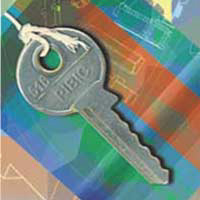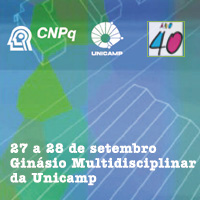|
Congress Description
Scientific initiation activity at UNICAMP has been systematically increasing in quality and quantity, attracting growing interest from both the student body and the university's faculty. In addition to scholarships from the Institutional Scientific Initiation Scholarship Program - PIBIC/CNPq - and scholarships offered by the São Paulo Research Foundation - FAPESP -, UNICAMP has a scholarship program with its own resources, through the Student Support, SAE. In 2005, 516 scholarships were awarded by the PIBIC/CNPq program, 244 research scholarships by SAE/UNICAMP, 252 scholarships by FAPESP and 80 scholarships in integrated projects by CNPq, totaling 1.092 scholarships. The main impacts of the program are better preparation for postgraduate studies and the development of independent reasoning, creativity and method in dealing with new problems that this experience provides to the students involved.
In 2005, UNICAMP had 1.748 teachers, 96,5% of whom had a doctorate degree. It also had 16.143 undergraduate students and 10.249 postgraduate students. As a result of the activities of postgraduate students, in 2005, 1.095 Master's Theses and 873 Doctoral Theses were defended. Among those who defended their thesis, there are numerous students who participated in the CNPq scientific initiation program. The Dean of Research has a great interest in continuing to encourage Scientific Initiation at UNICAMP, due to its importance and the good results achieved so far.
In terms of the demand presented in 2005, together with the Integrated Program of Scientific Initiation Scholarships, encompassing PIBIC/CNPq and the Research Scholarships of the Student Support Service - SAE, of the 1.142 projects received, 967 had scientific academic merit to be financed, representing, therefore, 85% of well-qualified projects in relation to gross demand, as shown in the table below:
| Area |
Demand in 2005 |
Qualified Demand in 2005 |
Excellent |
Good |
Good with Reservations |
PIBIC/CNPq Concessions |
SAE Concessions |
| Fine Arts |
59
|
53
|
20
|
17
|
16
|
28
|
13
|
| Biological |
266
|
213
|
92
|
61
|
60
|
113
|
52
|
| Exact Sciences |
181
|
149
|
59
|
51
|
39
|
80
|
37
|
| human |
231
|
209
|
127
|
43
|
39
|
112
|
52
|
| Technological |
405
|
343
|
94
|
148
|
101
|
183
|
84
|
In 2006, the Dean of Research at UNICAMP received 1.293 applications for the Integrated Scientific Initiation Scholarship Program, also including PIBIC/CNPq and Research Scholarships from the Student Support Service - SAE, representing an increase of 23 .XNUMX% compared to the previous year's demand, according to the data below:
| Project Area |
Number of Enrollments Quota August 2006 to July 2007 |
| Fine Arts |
73
|
| Biological |
296
|
| Exact Sciences |
199
|
| human |
281
|
| Technological |
444
|
| Total |
1.293
|
At UNICAMP, scientific initiation projects are subject to careful monitoring. In addition to a rigorous selection process, during the term of the scholarship, each scholarship holder must submit two reports, which are analyzed by their supervisor and by the advisors of the Advisory Committee of the Deans of Research and Undergraduate Studies.
The holding of this XIV Internal Scientific Initiation Congress at UNICAMP reiterates the consolidation of research activity among undergraduate students in all major areas of knowledge. This year, we have the presentation of 1050 scientific works, 13,5% more than at the Congress held in 2005. This presence illustrates the interest of students in attending the event, due to its resonance within the University and even externally. . Below are the registrations by Area for this year's Congress:
| Project Area |
Number of Enrollments in
XIV Internal Congress of Scientific Initiation of UNICAMP |
| Fine Arts |
51
|
| Biological |
258
|
| Exact Sciences |
175
|
| human |
219
|
| Technological |
347
|
The scientific initiation activity is institutionally considered as one of the strategic activities of UNICAMP's teaching and research areas, deserving full support and attention from the administration. On this occasion, UNICAMP is grateful for the effective support and trust deposited by CNPq in the work that has been developed.
The Deans of Research and Undergraduate Studies, responsible for coordinating the scientific initiation program, express their gratitude to the effective members of the Advisory Committee and the “ad-hoc” advisors who participated in the process of selecting scholarship holders and evaluating the reports by the precious time dedicated to the various activities that enable and guarantee the quality of UNICAMP's comprehensive scientific initiation program.
Likewise, they take the opportunity to express their thanks to the members of the Organizing Committees of this XIV Internal Congress of Scientific Initiation at UNICAMP and to all the advisors and students who participate in the program and event.
Campinas State University
Dean of Research, UNICAMP, September 2006
Prof. Dr Daniel Pereira
Dean of Research
Prof. Dr. Edgar Salvadori of Decca
Dean of Undergraduate Studies

|

